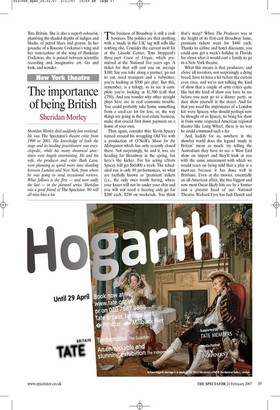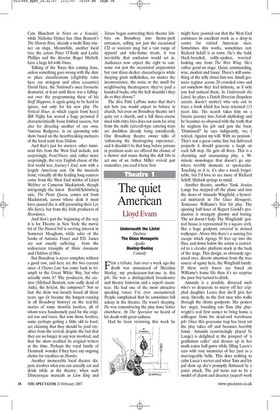The importance of being British
Sheridan Morley Sheridan Morley died suddenly last weekend. He was The Spectator's theatre critic from 1990 to 2001. His knowledge of both the stage and its leading practitioners was encyclopedic, while his many theatrical anecdotes were hugely entertaining. He and his wife, the producer and critic Ruth Leon, were planning to spend more time shuttling between London and New York, from where he was going to send occasional reviews. What follows is the first — and now sadly the last — in the planned series. Sheridan was a good friend of The Spectator. We will all miss him a lot.
The business of Broadway is still a cash business. The politics are that anything with a 'made in the UK' tag still sells like nothing else. Consider the current snob hit at the Lincoln Center, Tom Stoppard's three-part Coast of Utopia, which premièred at the National five years ago. A ticket for that will cost you on average $100. Say you take along a partner, go out to eat, need transport and a babysitter; you're looking at $500 per play. But this, remember, is a trilogy, so to see it complete you're looking at $1,500 (call that £750). And you wonder why other straight plays here are in real economic trouble. You could probably take home something from a used-car lot for less, or, the way things are going in the real-estate business, make that crucial first down payment on a home of your own.
Then again, consider this: Kevin Spacey turned around his struggling Old Vic with a production of O'Neill's Moon for the Misbegotten which has only recently closed there. Not surprisingly, he and it, too, are heading for Broadway in the spring, but here's the kicker. For his acting efforts Spacey will get $60,000 a week. The scheduled run is only 89 performances, so what are tactfully known as 'premium' tickets (i.e., the only ones worth having, where your knees will not be under your chin and you will not need a hearing aid) go for $200 each, $250 on weekends. You think that's steep? When The Producers was at the height of its first-cast Broadway fame, premium tickets went for $480 each. Thanks to airline and hotel discounts, you could now get a week's holiday in Florida for about what it would cost a family to go to a New York theatre.
What this means is that producers, and above all investors, not surprisingly a dying breed, have to have a hit before the curtain even rises, and we're not talking the kind of show that a couple of artsy critics quite like but the kind of show you have to see before you next go to a dinner party, or dare show yourself in the street. And for that you need the imprimatur of a London hit: were Spacey, who should perhaps now be thought of as $pacey, to bring his show in from some respected American regional theatre like Long Wharf, there is no way he could command such a fee And, luckily for us, nowhere in the showbiz world does the legend 'made in Britain' mean as much: try telling the Australians they have to see a West End show on import and they'll look at you with the same amazement with which we would react on being told that a play is a must-see because it has done well in Brisbane. Even at the movies, essentially an all-American affair, the two biggest and now most Oscar-likely hits are by a former and a present head of our National Theatre: Richard Eyre has Judi Dench and Cate Blanchett in Notes on a Scandal, while Nicholas Hytner has Alan Bennett's The History Boys, already a multi-Tony winner on stage. Meanwhile, another local trio, the actors Peter O'Toole and Leslie Phillips and the director Roger Michell, have a huge hit with Venus.
Talking of the Tonys this coming June, unless something goes wrong with the date or place classifications (eligibility rules here are stringent and often eccentric) David Hare, the National's once-favourite dramatist, at least until there was a fallingout over the programming there of his Stuff Happens, is again going to be hard to ignore, not only for his new play The Vertical Hour, in which (again from here) Bill Nighy has scored a huge personal if characteristically loose-limbed success, but also for directing another of our own, Vanessa Redgrave, in an upcoming solo show based on the heartbreaking memoirs of the local saint Joan Didion.
And that's just for starters: other imminent hits from the West End include, not surprisingly, Frost/Nixon, and, rather more surprisingly, the very English classic of the first world war, Journey's End, now with a largely American cast. On the musicals front, virtually all the leading long-runners come from the West End stables of Lloyd Webber or Cameron Mackintosh, though intriguingly the latest Boublil/Schonberg epic, The Pirate Queen, comes not from Mackintosh, across whose desk it must have passed (he is still presenting their Les Mis here), but from the Irish producers of Riverdance.
And that's just the beginning of the way it is for Theatre in New York: the movie hit of The Painted Veil is reviving interest in Somerset Maugham, while sales of the books of Antonia Fraser and PD. James are not exactly suffering from the widescreen triumphs of Marie Antoinette and Children of Men.
But Broadway is never complete without a good row, and here are the two current ones: A Chorus Line has come back in triumph to the Great White Way, but who actually owns it? The producers, the creator (Michael Bennett, now sadly dead of Aids), the lyricist, the composer? Not so fast: the show was loosely based all those years ago (it became the longest-running in all Broadway history) on the real-life stories of some showbiz hoofers, all of whom were handsomely paid for the original run and tours. But now those hoofers, some perhaps getting a little old to hoof, are claiming that they should be paid royalties from the revival, despite the fact that they are no longer in any way involved, and that the show credited its original writers at the time. Perhaps the royal family of Denmark wonder if they have any ongoing claims for royalties on Hamlet.
Another memorable local theatre dispute involves what you can actually eat and drink while at the theatre: when such Disneyesque musicals as Lion King and Tarzan began converting their theatre lobbies on Broadway into theme-park entrances, selling not just the occasional CD or souvenir mug but a vast range of apparel and take-home treats, it was inevitable that confusion would set in. Audiences now expect the right to consume not just the occasional peppermint but vast three-decker cheeseburgers while slurping giant milkshakes, no matter the inconvenience, the noise or the smell for neighbouring theatregoers: they've paid a hundred bucks, why the hell shouldn't they do as they choose?
The diva Patti LuPone notes that that's not how you would expect to behave in church, but even on Broadway theatre isn't quite yet a church, and a full three-course meal with extra fries does not seem far away from the stalls (aircraft-type catering trays are doubtless already being considered). One Broadway theatre owner talks of 'enhancing the theatregoing experience', and it shouldn't be that long before patrons in premium seats are offered the chance of a shower and sauna during the dull bits in act one of an Arthur Miller revival: just remember, you read it here first.























































 Previous page
Previous page